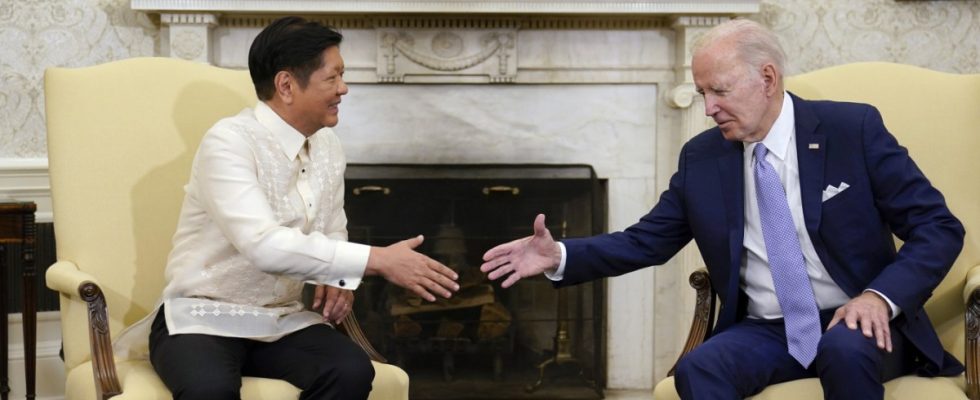Last week, Ferdinand Marcos Jr. attested that his country, the Philippines, was “probably the most complicated geopolitical situation in the world at the moment”. And with it probably himself. President Marcos Jr., known as “Bongbong,” is not considered a great speaker, but most political observers outside of China would probably agree with his assessment. It is therefore more than a vote of confidence that US President Joe Biden, during Marcos’ visit to Washington, described the USA’s connection to the Philippines as “iron-iron”, especially when it comes to the conflicts in the South China Sea. It is also a message to Beijing.
Given Biden’s advanced age, it was inevitable that he had met Marcos Jr. on a visit to the White House – when his father was still President of the Philippines. And, of course, one could have talked about the roughly $2 billion that Marcos Sr. looted in the Philippines and shipped to the United States when he and his wife Imelda fled exile to Hawaii in 1986. There is an unenforceable court judgment in the US against the Marcos family over this hidden fortune. But as president, Marcos Jr., who is no longer quite young at 65, is immune to US prosecution. And there are bigger problems at the moment.
On the one hand, Beijing has been disregarding Philippine maritime rights for some time. Attacks on boats navigating the South China Sea are frequent. On the other hand, according to the US, there is a risk of an invasion of Taiwan by China. And the Philippines is the closest of the five US allies in the Indo-Pacific, the other four being Australia, South Korea, Japan and Thailand. The northernmost Philippine landmass, Luzon, is only 200 kilometers from Taiwan.
At the meeting with Marcos Jr., Biden emphasized “that an armed attack on the Philippine forces, ships or aircraft in the Pacific cannot be tolerated”. Under the “Enhanced Defense Cooperation Agreement” (EDCA), which was expanded during the Marcos visit, Washington will receive three Lockheed C-130 Hercules-Relocate transport planes and send additional patrol vessels to the Philippines.
The EDCA, which was passed in 2014, allows the Philippines to access US ships and planes – without the establishment of permanent military bases. The Philippines were a US colony until 1946, which is one of the reasons why the EDCA has been heavily criticized in the country, most recently when it was expanded last month. It has since also enabled joint military training, equipment storage and the construction of facilities such as runways, fuel storage facilities and shelters. Of particular importance, however, is the access of the USA to four additional locations in the Philippines.
“This is an act that exacerbates tensions in the region,” said the spokesman for China’s foreign ministry
Washington wants to counter Beijing’s aggressive expansion of power in the Southeast Asian region with a strong alliance, and the Philippines is a key partner. Biden and Marcos Jr. also discussed increased economic cooperation – currently China is the Philippines’ main trading partner.
Therefore, before his trip to Washington, Ferdinand Marcos Jr. also sent a signal the other way, to Beijing, when he said in a press conference that “we will not allow the Philippines to get caught between the fronts”. Last month, the Chinese ambassador in Manila warned the Philippine government not to work for Taiwan’s independence “if you care about the 150,000 foreign workers of Filipino origin” who live there. That could only be taken as a threat. And at the same time to Manila, Taipei and Washington.
Ferdinand Marcos Jr. stayed in Washington after his meeting with Joe Biden, where he spoke at the Center for Strategic and International Studies about the complicated relations between his country and the superpowers. He said the US had not asked the Philippines to provide troops in the event of a war over Taiwan. It is about access to bases that are suitable for countering the effects of climate change. However, one can doubt that.
“This is an act that increases tensions in the region and endangers peace and stability in the region,” said Chinese Foreign Ministry spokesman Mao Ning last Thursday on the expansion of the EDCA. This brings the total number of US locations to nine. Luzon could serve as a potential site for missiles, missiles and artillery systems for the US military, even if it is said that it is only about climate change.
Joe Biden will travel to Tokyo later this month to meet with the leaders of Japan, India and Australia, known as the Quad Group. On Saturday, thousands protested in Port Kembla, in the Australian state of New South Wales, against a future nuclear submarine base that is to become part of the $244 billion AUKUS defense pact between Australia, the US and Britain. But here, too, it is primarily about one country: China.

